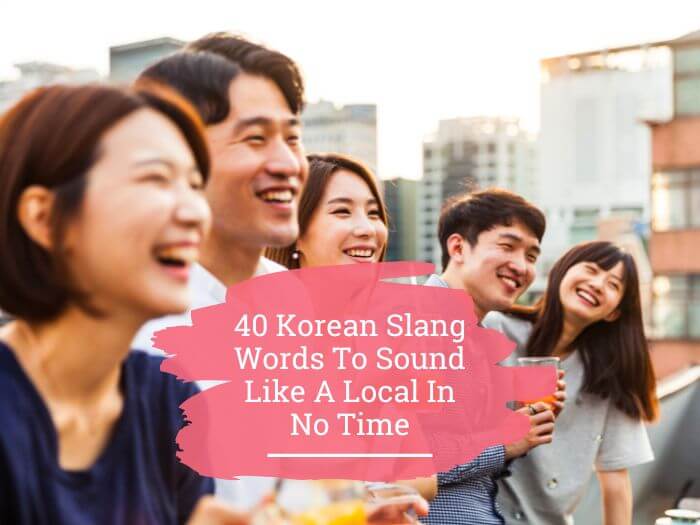Korean slang is essential for improving your conversational skills in Korean, understanding what you read on the internet, and understanding the dialogue in your favourite K-dramas.
Korean is a really versatile language and there’s no shortage of Korean slang phrases to dig into so you can sound more like a native speaker.
In this post, you'll discover 40 Korean slang words and phrases so you can get stuck right in. If you want to know what it means if you have 썸 sseom with a crush, or what a 셀카 selka is, stick around.
Remember that Korean is a language that has an elaborate system of politeness, so be mindful about using slang in Korean with somebody who is more senior than you.
Pro Tip
By the way, if you want to learn Korean fast and have fun while doing it, my top recommendation is Korean Uncovered which teaches you through my fun, unique and effective StoryLearning® method.
If you’re ready to get started, click here for a 7-day FREE trial.
Table of Contents
Common Korean Slang Words
To get you started in Korean slang, here are some frequently used words that you may well have heard already. Even if you don’t know the word yet, chances are you’ve taken a selka.
As you go through this post, you’ll notice that many of these words usually consist of the first two syllable blocks combined together to make a new word. This is a common way of forming slang words in Korean.
To learn more about syllable blocks, check out my post about how to write in Korean.
Otherwise, onward with common Korean slang!
1. 셀카 selka (selfie)
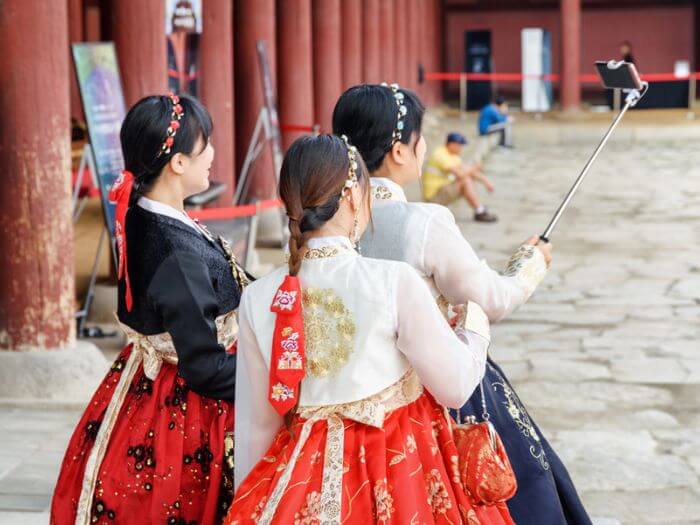
In the age of smartphones, we’ve all heard of the word selfie before. The Korean equivalent word is selka, a handy shorted version of a combination of the words 셀프 selpeu (self) and 카메라 kamera (camera), meaning to take a picture of yourself.
2. 짱 jjang (great, amazing)
Fan of K-pop? Then this one might be a slang word you’ve heard before. Usually said in exclamation, you can say this alone to mean something like “amazing” or “fantastic”.
You might have also heard the phrase 몸짱 momjjang, which is often used in K-pop to refer to idols with a great body. Jjang can be used as a standalone word.
3. 알바 alba (part-time job)
This common Korean slang word has an interesting origin. It’s actually a shortened form of the word 아르바이트 areubaiteu meaning “part-time job” in Korean. The word areubaiteu actually comes from the German word arbeit, which means “work”.
4. 소맥 somaek (a mix of soju and beer)
Somaek is made up of소주soju and 맥주 maekju (beer), and it refers to a popular mixed alcoholic drink in Korea.
Different people have their own way of mixing it, and one method involves sticking a metal chopstick straight down into the middle of the glass so the soju rises up and mixes with the beer.
5. 치맥 chimaek (chicken and beer)
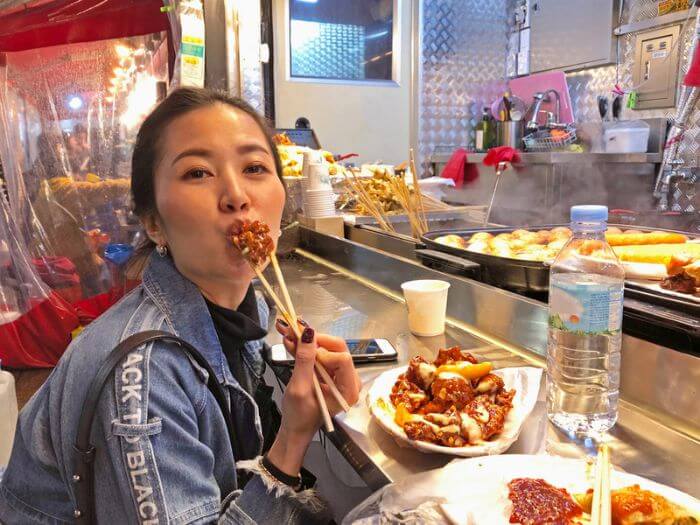
What do you get when you combine the words 치킨 chikin (fried chicken), and 맥주 maekju (beer) in Korean? A beloved Korean past-time, that is, eating Korean fried chicken (the other KFC) and washing it down with some beer.
Chimaek became so popular internationally after the release of the K-drama My Love From the Star that fans were queuing up outside their local chimaek restaurants to get a taste! I can understand though, it is delicious!
6. 당근 danggeun (of course)
Yes, this is the same word for carrot. No, it doesn’t mean carrot! So, how does the word for carrot become “of course”? Well, because it sounds a lot like the phrase 당연하지 dangyeonhaji, which means “of course”.
7. 대박 daekbak (amazing, cool)
Any list of Korean slang words truly wouldn’t be complete without daebak or cool in Korean slang! With a meaning and usage akin to “amazing, cool” in English, you can use this word for pretty much anything.
Let’s say your best friend just got a new job they’d been wanting, that’d be pretty daebak! Your favourite K-pop group just had a successful comeback? Well, that’d be pretty daebak too!
8. 댓츠노노 daetchu nono (that’s no no)
This is a fun little way of disagreeing with someone using Korean slang and spicing up your conversational skills. This phrase is a Koreanised way of saying “that’s no no” in English.
9. 헐 heol (omg)
This is a lot like saying “omg” in English, and is used to express moderate shock or surprise. Koreans say this a lot, so definitely take a note and don’t forget it!
10. 베프 bepeu (bestie)
This is a shortened “Konglish” (Korean English) version of the phrase “best friend”, 베스트 beseuteu (best) and 프렌드 peurendeu (friend).
So, if you’ve got one friend you like a little more than the others, this is the phrase that you’d use.
Korean Dating Slang
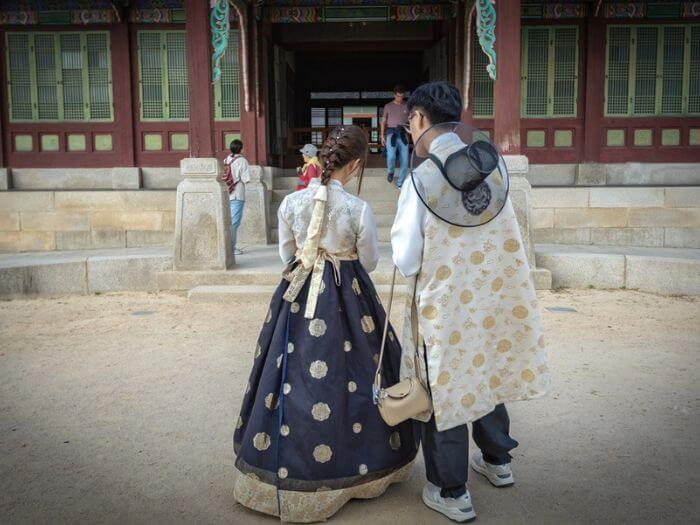
Like anywhere else in the world, there are a lot of Korean slang words that revolve around dating culture.
There are a few distinct aspects of Korean dating culture, but I'm not going to go into details about that here, so sit back, relax, and enjoy some Korean dating slang.
Don’t blame me if you try these out on your crush and they don’t work out though!
11. 남친 namchin (boyfriend)
Once again, this is a shortened form of a longer phrase 남자 친구 namja chingu (boyfriend), made by taking the first syllable block of each individual word and mixing them together. The same rules apply for 여친 yeochin, which means girlfriend.
12. 밀당 mildang (push and pull)
Ever found that somebody is really interested in you only to suddenly change their attitude?
Mildang is the Korean equivalent of saying somebody is “hot and cold” or “playing hard to get”, and is a shortened form of the phrase 밀고 당기다 milgo danggida, which has the same meaning.
13. 심쿵simkung (heart racing)
This is another shortened word that derives from the longer phrase 심장 simjang (heart) and 쿵 kung, the sound the heart makes when it pounds.
This is a word that you use when your heart is pounding and beating out of your chest, a lot like the feeling you get when you see your crush.
14. 모쏠 mossol (perpetually single)
This one will either make you laugh or cry, but it’s a shortened Korean slang phrase for 모태 솔로 motae solo, which quite literally means “single since mother’s womb”.
This phrase essentially refers to somebody who has been single for a very very long time, or has never been in a relationship at all. Don’t be surprised if some of your friends don’t take too kindly to this one!
15. 읽씹 ilkssip (to be left on read)
This Korean internet slang term is firmly in the category of dating slang in the era of social media and messaging apps, and means to be left on read. This term is used when somebody has read your message but hasn’t replied… 헐!
Although that sounds bad enough, there’s another word for an even worse situation. That is, when somebody hasn’t even opened your message: 안읽씹.
16. 게미 kemi (chemistry)
This is yet another shortened version of the longer Korean word 케미스트리 kemiseuteuri (chemistry), and, as you may have guessed, refers to having romantic chemistry with somebody.
17. 썸 ssom (something)
This is another Korean slang word that derives from an English word, in this case, “something”. You’d say 썸 when you’re beginning to suspect that two people might be having feelings for each other but haven’t acted upon it yet. The verb 썸타다 sseomtada means “to flirt”.
18. 남사친 namsachin (male friend)
Imagine that you’ve just introduced a new male friend to your friendship group and they begin to think something’s up… but you’re just friends.
This phrase, a shortened version of 남자 사람 친구 namja saram chingu, literally, “male person friend”, is used to specifically emphasise that it’s just a friend, nothing more.
The equivalent phrase 여사친 yeosachin is used for a female friend.
19. 횰로 hyollo (enjoying being single)
Thought that 모쏠 was just a little bit harsh? Well, this newly coined Korean slang phrase makes being single sound better.
횰로 is a funny combination of the Korean word for alone 홀로 hollo meaning “alone”, and the English slang phrase YOLO (you only live once).
So, when you put these two together, it refers to someone who is single but enjoying themselves.
20. 자만추 jamanchu (to meet somebody naturally)
In K-dramas it’s pretty usual to just bump into the future love of your life. But as sad as it is to admit this, this doesn’t always happen in real life.
Meeting your romantic partner through blind dates and group meetings is common practice in Korea, and so this phrase refers to meeting your partner naturally (as in, not through dating apps either).
Korean Texting Slang

The internet has made it a lot easier for us to communicate with each other, partly aided by all the shortened forms and slang that we can now use when we text or message people.
Koreans have come up with some pretty innovative ways of shortening text in online communication. So next time you message a Korean friend on KakaoTalk, why not try one of these Korean text slang terms out?
21. ㅋㅋ (lol)
If you’ve ever messaged a Korean friend on KakaoTalk you may have seen them reply with a long string of ㅋㅋㅋㅋㅋ. This is a lot like saying “lol”, except the more ㅋㅋ you use the funnier it is! You might even see an entire block of text only consisting of ㅋㅋ!
22. ㅇㅋ (OK)
This is a shorthand form of the Koreanised version of the English word OK, which is written as 오케이 okei. The meaning is the same as in English, and this is just a very handy and simple way of expressing acknowledgement.
23. ㅠㅠ (crying eyes)
This isn’t really an abbreviation, but more of a visual representation of crying eyes. Can you see the tears? You’d use this when you’re feeling upset or sad about something.
24. 8282 (quickly)
This certainly isn’t the most obvious Korean slang word on this list, but it’s a very intelligent way of using Korean numbers.
The word for doing something very quickly is 빨리빨리 ppallippalli. Now, this sounds like the Korean for the numbers 8 팔 and 2 이, hence, 8282!
25. ㄱㅅ (thank you)
Let’s be honest, we’ve not always got time to type out long phrases. This is a very very shortened version of the formal 감사합니다. Don’t forget that this is a very informal word, and wouldn’t be appropriate for someone more senior than you.
26. ㅎㅎㅎ (hahaha)
This is a lot like saying “hahaha”, and it refers to a laugh that is a little bit lighter and softer than saying ㅋㅋㅋ. Again, the more you use, the funnier it is.
27. ㄴㄴ (no no)
From 노노 nono, this is a fun little way of saying “no”. Like all of the rest of these text-based slang words, this is firmly on the informal side, but on the plus side, it will save you a lot of typing time.
28. ㅂㅂ (bye bye)
With all of these text-based slang words, you’re going to be saving a lot of time typing in Korean with your Korean friends!
This is a shortened version of the word 바이바이 baibai, which is in turn adapted from the English word “bye bye”.
29. ㅅㅇㅊㅋ (happy birthday)
This is not a random selection of Hangeul (the Korean alphabet), rather, it’s a shorthand way of writing out 생일축하해 saengilchukhahae, which means “happy birthday” in Korean.
This might be especially useful if you have a lot of friends born in the same month and you get tired writing out birthday messages!
30. ㄱㅊ (it’s OK)
If you want to offer someone a quick word of reassurance, this is a shorthand way of writing out the phrase 괜찮아.
Other Korean Slang Terms

Like I said before, I'm not going to be able to list all the Korean slang words and phrases in this article, as there really are so many (and new Korean slang is springing up every year!).
The slang words in this part of the article are Korean slang expressions that couldn’t fit into the other categories above. Here we go!
31. 멘붕 menbung (mental breakdown)
Once again, this is a shortened version of a larger phrase 멘탈 붕괴 mental bunggoe, and you use it for any situation where your brain has completely collapsed.
It’s not restricted to any particular emotion, just any moment where you’re mind blown (both in a positive and negative way).
32. 노잼 nojaem (not fun or interesting)
This shortened phrase is derived from the Koreanised version of the English word 노 (no), and the Korean word 재미있어요 jaemiisseoyo (fun). So basically, what this word means in Korean is that something is “no fun”.
33. 꿀잼 kkuljaem (fun or interesting)
This is the equivalent phrase of 노잼, and is used when something is actually fun and interesting. 꿀 kkul means “honey” in Korean, and as you saw above, 잼 is a very abbreviated form of “fun”.
34. 맛점 matjeom (delicious lunch)
Delicious food is one of the biggest delights of life, and this is no less true in Korea where there are plentiful dishes you can sink your teeth into.
This phrase is short for 맛있는 점심 and there’s no hidden meaning here… it really does just mean a delicious lunch!
35. 엄친아 eomchina (someone who is good at everything)
This slang word gives you a bit of insight into Korean culture. In Korea, it’s common to discuss the successes and achievements of your child, especially when you’re maybe looking to compare them to others.
Derived from 엄마친구의 아들 eommachingu adeul (my mother’s friend’s son), this is used to refer to someone who is good at everything. The equivalent 엄친딸 eomchinttal is used for a woman.
36. 현웃 hyeonut (laugh out loud)
Where ㅋㅋㅋ is a way of expressing laughter in text, this word is used to place more distinct emphasis on the fact that you actually did laugh out loud.
Derived from 현실에서 웃음 hyeonsireseo useum (laughter) in real life, you can let someone know that you really did laugh out loud!
37. 뭥미 mwongmi (what the?)
It’s happened to the best of us, you’re typing something out fast, and you make a typo. Well, this slang word originates from a misspelling of the word 뭐임 mwoim that means “what the?” or “what is this?”. This slang has exactly the same meaning as its original form.
38. 불금 bulgeum (TGIF)
We all love that Friday feeling, and in Korean this phrase from “fire” 불 bul and “Friday” 금요일 geumyoil means just that! This is perfect for when the week is finishing and you’re looking forward to enjoying the weekend ahead.
39. 아점 ajeom (brunch)
Brunch is the meal between “breakfast” 아침 achim and “lunch” 점심 jeomsim. Take the first syllable of each word and put it together and you’ve got yourself the Korean slang word for brunch!
40. 아싸 ahssa (oh yeah!)
This is what you’ll be saying after you finish reading this post and you understand Korean slang a bit better! This can be used either enthusiastically or sarcastically, depending on the context.
Korean Slang FAQ
What Is WTF In Korean Slang?
The Korean equivalent of “WTF” is often expressed as 뭐야?Mwoya?, meaning “What is this?” or “What the heck?” For stronger reactions, people use 헐 (Heol), which expresses shock or disbelief.
What Is 18 In Korean Bad Word With Meaning?
The number 18 (십팔, ship-pal) in Korean can sound similar to a curse word, 씨발 (ssi-bal), which is a vulgar expression similar to “f***” in English.
While the number itself isn't inherently bad, the phonetic similarity often leads to jokes or intentional misinterpretation.
What Is Some In Korean Slang?
썸 Sseom refers to a flirtatious or undefined romantic relationship, akin to “seeing someone” in English. It's used to describe the stage where two people are interested in each other but not officially dating yet.
What Does Bak Bak Mean In Korean Slang?
박박 bak-bak is not commonly used slang, but it can mean “scrubbing” or “rubbing” in a literal sense, depending on the context. 대박 daebak on the other hand is a Korean slang word that means “cool” or “amazing”.
Time To Use Korean Slang In Conversation!
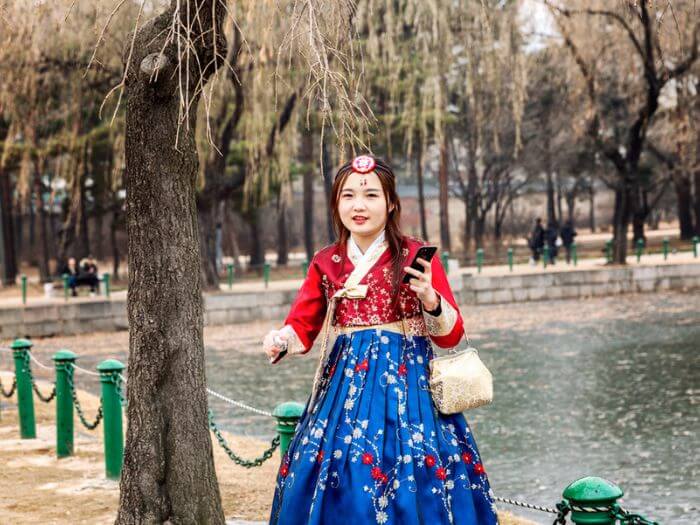
That’s a wrap!
Korean slang will boost your Korean speaking and conversational skills to all new levels.
But be sure that you keep these words between friends or people that you know well, as they could be inappropriate for people that are in a more senior position than you.
Communication these days isn’t all spoken face-to-face, so you’ll be able to put some of these slang words to practice in conversations with Korean friends on an app like KakaoTalk.
Another way to get to grips with Korean slang is to follow the rules of StoryLearning and read, whether that's short stories in Korean or blogs for Korean learners. As you read, you'll see Korean slang over and over so you'll soon start using it with confidence.

Olly Richards
Creator of the StoryLearning® Method
Olly Richards is a renowned polyglot and language learning expert with over 15 years of experience teaching millions through his innovative StoryLearning® method. He is the creator of StoryLearning, one of the world's largest language learning blogs with 500,000+ monthly readers.
Olly has authored 30+ language learning books and courses, including the bestselling "Short Stories" series published by Teach Yourself.
When not developing new teaching methods, Richards practices what he preaches—he speaks 8 languages fluently and continues learning new ones through his own methodology.
